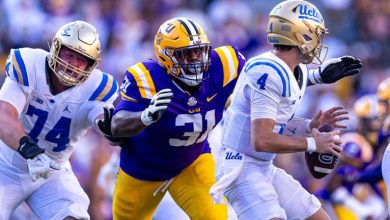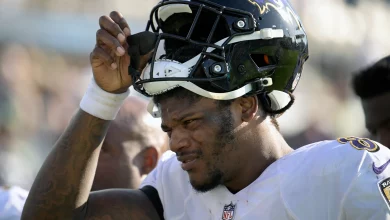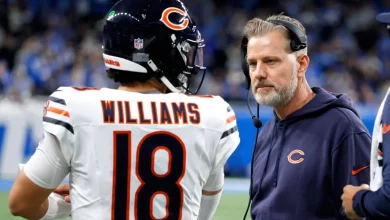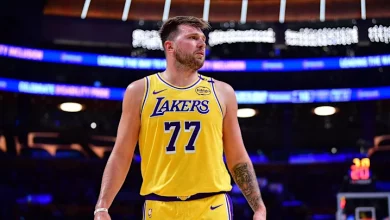Similar to Nick Saban’s harsh criticism, Ryan Grubb’s coaching approach combines tough love with high standards to promote progress.
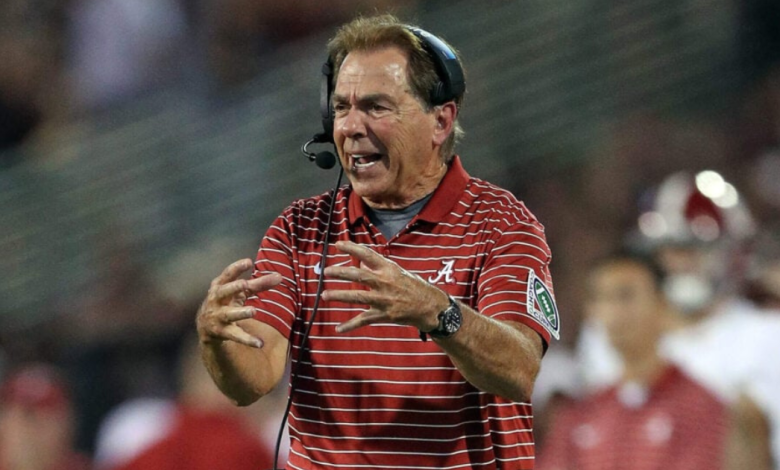
In the world of college football, the spotlight often shines on the players, but it’s the coaches who shape the team, instill discipline, and build the foundation for success. Among the most prominent coaching figures in the sport is Nick Saban, whose no-nonsense, hard-driving style has led the University of Alabama to unparalleled success. His ability to motivate through tough love and high standards has become a model for coaches at all levels.
While Saban’s methods are well-known, they have also inspired a new generation of coaches, including Ryan Grubb, who has emerged as one of the most talked-about offensive minds in college football. Grubb’s approach is often compared to Saban’s, particularly in terms of the tough love he instills in his players and the high expectations he places on their performance.
This article delves into the coaching philosophy of Ryan Grubb and compares it to that of Nick Saban, examining how their approaches — rooted in discipline, tough love, and an emphasis on high standards — drive progress and foster success on the field.
The Foundations of Tough Love in Coaching
Tough love in coaching is more than just a motivational tool — it’s a philosophy. Both Saban and Grubb understand that the true potential of a player is unlocked only when they’re pushed beyond their comfort zones. Their approach is designed to get the best out of players, not by coddling them, but by setting clear expectations and holding them accountable for their actions.
Nick Saban’s brand of tough love has been integral to his success. From his time at Michigan State, LSU, and most notably at Alabama, Saban has cultivated a reputation for demanding excellence from his players. His approach is direct and often stern, but it’s backed by a belief that only through hardship and adversity can athletes truly grow. Saban’s criticisms are sharp, but they’re always aimed at improving a player’s performance, fostering a mentality of continuous improvement.
Ryan Grubb, though relatively new to the national spotlight, has adopted a similar coaching style. Known for his work as Washington’s offensive coordinator, Grubb has consistently demonstrated his ability to build high-powered offenses while maintaining a strong sense of discipline. Much like Saban, Grubb does not shy away from expressing disappointment when players fall short of expectations, but his criticism is always constructive. He pushes his players to be their best, and like Saban, Grubb’s ultimate goal is to prepare them for the next level — whether that’s the NFL or simply becoming the best version of themselves on the field.
High Standards: Setting the Bar for Excellence
Both Saban and Grubb set incredibly high standards for their players. For Saban, these standards are part of a broader culture of excellence that permeates every aspect of the Alabama football program. From conditioning to film study to mental toughness, Saban expects nothing less than perfection. His famous “process” emphasizes the importance of attention to detail and consistency in every aspect of the game.
Grubb shares a similar commitment to excellence. At Washington, he has been instrumental in transforming the Huskies’ offense, leading the charge in developing dynamic, high-scoring systems. His offensive philosophy emphasizes speed, precision, and the ability to execute under pressure. Just like Saban, Grubb’s focus on the finer details of the game has led to an offense that doesn’t just succeed but dominates. He demands precision in every pass, every block, and every decision made on the field.
However, it’s not just about schematics. Both coaches understand that success comes from creating a culture where players are held accountable for their actions. This means maintaining discipline in every aspect of their lives — from showing up on time to practice to handling their academic responsibilities. For Grubb, as it is for Saban, maintaining high standards is about setting the tone for the entire program. Every player is expected to contribute to the team’s success, not just on game day but in every moment leading up to it.
The Power of Criticism: Tough Words with a Purpose
One of the key similarities between Ryan Grubb and Nick Saban is their use of criticism. Both coaches understand that harsh words, when delivered correctly, can lead to growth. While this style may be unsettling to some players, both Grubb and Saban know that athletes who are pushed beyond their comfort zones often achieve greatness.
Saban’s style of criticism is well-documented. He is infamous for his “butt-chewings” — scolding players during practices and games when they fail to meet his standards. These moments, while intense, are always followed by a teaching moment. Saban believes that players need to understand the consequences of their mistakes, but he also makes it clear that he has a plan to help them improve. He holds his players to a higher standard because he knows what they’re capable of, even if they don’t always see it themselves.
Similarly, Grubb uses criticism as a tool for improvement. While he may not be as widely known for his scoldings as Saban, Grubb’s approach is no less direct. He is a coach who expects effort and results, and he isn’t afraid to express his dissatisfaction when things go wrong. However, Grubb’s criticism is always paired with guidance. He takes the time to break down what went wrong, showing his players the path to improvement. Whether it’s in film sessions or on the practice field, Grubb is clear in his expectations, and his players understand that his tough words are always designed to make them better.
Building Mental Toughness: Preparing for Adversity
One of the cornerstones of Nick Saban’s coaching philosophy is building mental toughness. For Saban, mental toughness is just as important as physical ability. He’s known for pushing players to their limits, both physically and mentally, with the goal of preparing them for the inevitable challenges they’ll face during the season. Through intense training and psychological conditioning, Saban prepares his players to stay focused and resilient in the face of adversity.
Ryan Grubb, while perhaps not as famous for his psychological conditioning as Saban, shares a similar belief in the importance of mental toughness. As an offensive coordinator, Grubb has worked with a variety of quarterbacks and offensive players, each with their own unique challenges. Whether it’s helping a quarterback manage pressure in a big game or motivating his offensive line to stay focused during a difficult practice, Grubb understands the value of mental resilience. His players are trained to handle adversity — to stay poised when things aren’t going their way and to keep pushing forward when faced with obstacles.
Grubb’s ability to build mental toughness is reflected in his offenses’ ability to execute under pressure. His offensive schemes are designed not only to take advantage of opposing defenses but also to test his players’ mental endurance. When things aren’t going well on the field, Grubb’s players know that their ability to stay focused, stay calm, and execute will determine the outcome of the game.
The Role of Leadership and Accountability
Both Saban and Grubb know that leadership and accountability are critical components of a successful team. Under Saban, Alabama players are taught to take responsibility for their actions, both on and off the field. Saban’s leadership style is rooted in the belief that every player must take ownership of their role on the team. Whether it’s a star player or a backup, everyone must contribute to the team’s success, and everyone is held accountable for their performance.
Grubb shares this belief in accountability. He encourages his players to step up and take responsibility for their individual actions, whether it’s in their execution on the field or their commitment to the program’s values. His coaching style fosters an environment where leadership is earned through hard work, and players are given the tools to hold themselves and their teammates accountable. Like Saban, Grubb’s leadership philosophy is built on mutual respect, where the players understand that the collective success of the team depends on their individual contributions.



